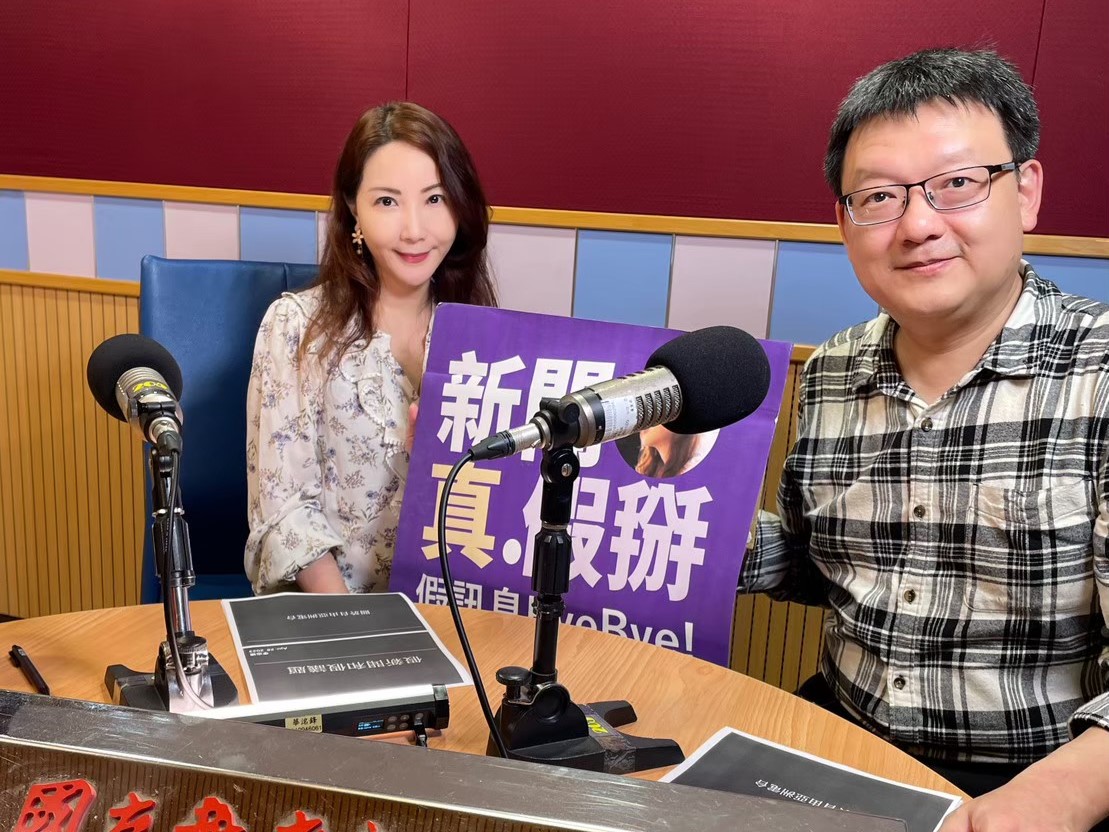Head of Asia Fact Check Lab shares four evolutionary trajectories of disinformation
The head of a fact-checking body under a United States media company has recently shared his organization’s tips and best practices in debunking fake news during an interview with a Taiwan FactCheck Center Podcast.
In an interview with Chao-Hwei Huang, host of the National Education Radio show/podcast “Bye Bye Fake News,” Chih-Te Lee, director of Asia Fact Check Lab under the Radio Free Asia (RFA), said fact-checking has become increasingly important nowadays, which is why the RFA has recently launched the lab.
Image: The Director of Asia Fact Check Lab under the Radio Free Asia (RFA) Chih-Te Lee (R), gave an interview to the Taiwan FactCheck Foundation podcast “Bye Bye Fake News,” speaking to the podcast host Chao-Hwei Huang about his team's mission and work.
Founded in 1996, RFA is a United States government-funded private non-profit news service that broadcasts radio programs and publishes online news, information, and commentary for its audiences in Asia.
The service has the stated mission of providing accurate and uncensored reporting to countries in Asia that have poor media environments and limited protections for press freedom and freedom of speech.
According to Lee, however, the current problem in Asia is no longer limited access or blockage of information; it is the fact that the authoritarian regime has been taking advantage of the currently free and open information environment to broadcast their own propaganda to the democratic world in an attempt to spread fake news and misinformation to exert influence to free-thinking people.
Therefore, RFA has decided to launch a new Asia Fact Check Lab platform that aims to provide viewers with accurate and unbiased analysis of China-related statements made in public in order to counter misinformation and disinformation and to increase knowledge of critical issues, according to Lee.
Lee also shared with the podcast host the daily operations of his lab; their main job is divided into two parts: interviewing people and doing research for the purpose of fact checks.
In terms of fact-checking, Lee said fact-check reports are important because they could be available online for a very long time. These reports can play a role in helping people better understand the meaning behind the dissemination of fake news and its political purposes.
Unlike other fact-checking organizations in Taiwan, Lee said his team focuses not only on debunking fake news in Taiwan. It is also working with RFA’s other foreign language news departments to help fact-check misinformation that has been spread in other parts of the world.
For instance, RFA’s Uighur language department helps to translate news and information related to the Ürümqi deadly fire that happened in late 2022 that have been widely circulating online, while its Vietnamese language department did its part to debunk false information concerning that mistakenly saw the Vietnamese government dissing the Blinken by allegedly not displaying a U.S. flag during in a April trip.
Lee said his team has also found four evolutionary trajectories of disinformation. First of all, many of these false information are overly one-sided stories.
For instance, in a previous U.S.-based think tank report featuring simulation results on the People’s Liberation Army’s potential invasion of Taiwan, one widely circulated piece of misinformation intentionally highlighted one of the most extreme scenarios in the report to discredit the whole report.
Also, rumor spreaders would repeatedly question the said think tank report and accuse the report of being funded by certain companies to question its credibility.
The third widely used method by rumor spreaders is to take things out of context.
For instance, the Taiwan Fellowship Program is a yet-to-be-launched program that would allow U.S. federal employees to work in Taiwanese government agencies for a year.
However, rumor spreaders have taken the program out of context, accusing it without evidence that the U.S. is launching it to send spies into Taiwanese government units to collect confidential information, Lee said.
The final evolution path of a piece of misinformation is that pro-China TV show hosts in Taiwan would often intentionally misinterpret a certain topic and, via conversations with their guests, present a totally different story to their views for their own political gains.
“Fact-checking is like cleaning up shit inside a shithole,” Lee told the podcast host.
The job is an extremely difficult but worth the effort because it will help prevent the spread of misinformation and keep more people “away from the shithole,” according to Lee.
Read the Chinese version of the interview here. Listen to the podcast interview here.






